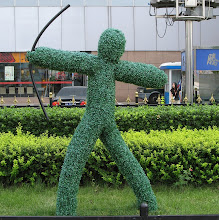Admittedly, these non-mainstream areas of inquiry address certain human needs, which mainstream science and other areas of intellectural inquiry inherently cannot. One such needs involves our common experience as human that we freely make our own choices and decisions in life and therefore carry some responsibilities for their consquences. Faced with infinite choices, we experience uncertainty, insecurity, and confusion; and we feel remorse, regret, and guilt when in retrospect our choices turn out to be poor ones. Understandably, to prevent these bad feelings many people try to shift the burden of making difficult choices and decisions to some nebulous authority outside themselves--by relying on the stars or on a stack of tarot cards for guidance.
Above is a paragraph in the GRE analytical writing preparation book. I like this paragraph particularly because of its keen perception and revelation of human trait in the course of argument, which reminds me of the following paragraph:
We continue to share with our remotest ancestors the most tangled and evasive attitudes about death, despite the great distance we have come in understanding some of the profound aspects of biology. We have as much distaste for talking about personal death as for thinking about it; it is an indelicacy, like talking in mixed company about venereal disease or abortion in the old days. Death on a grand scale does not bother us in the same special way: we can sit around a dinner table and discuss war, involving 60 billion volatilized human deaths, as though we were talking about bad weather; we can watch abrupt bloody death every day, in color, on films and television, without blinking back a tear. It is when the numbers of dead are very small, and very close, that we begin to think in scurrying circles. At the very center of the problem is the naked cold deadness of one’s own self, the only reality in nature of which we can have absolute certainty, and it is unmentionable, unthinkable. We may be even less willing to face the issue at first hand than our predecessors because of a secret new hope that maybe it will go away. We like to think, hiding the thought, that with all the marvelous ways in which we seem now to lead nature around by the nose, perhaps we can avoid the central problem if we just become, next year, say, a bit smarter.

No comments:
Post a Comment